小升初重点句型
2022-2023(2)专题十 句型(小升初英语全国通用版)
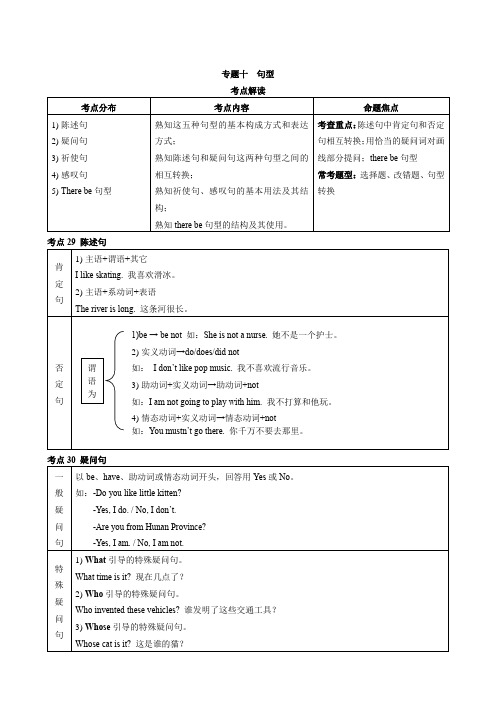
专题十句型考点29 陈述句考点30 疑问句考点31 祈使句考点32 感叹句【经典分析】【例1】I have some pens.(把肯定句改成否定句)[思路指导]句意:我有一些笔。
此句中,have是谓语动词。
变成否定句时,在have前加do的相应否定形式。
主语是第一人称I,所以在have前加do not。
并注意some用在肯定句,否定句中要换成any。
[参考答案]I don’t have any pens.【例2】-Are you new interns(实习生)?-Yes, .A. they areB. you areC. I amD. we are[思路指导]句意:你们是新的实习生吗?是的,我们是。
此句中,主语是you,可以译为你或你们,所以肯定回答中的主语是I或we。
然后,在句的末尾出现的表语为名词复数interns,由此可以判断出主语为we。
[参考答案]D【例3】play chess.A. LetB. Let meC. LetsD. Let’s[思路指导]句意:我们一起下象棋吧。
由句意可以看出是在提议作某件事情,并且可以看出宾语不是一个人,而是多个人。
因而要用Let us,其缩写形式为Let’s。
[参考答案]D【例4】heavy rain it was!A. WhatB. What aC. HowD. How a[思路指导]句意:好大的一场雨啊!根据题干中结构heavy rain it was=形容词+名词+主语+谓语,可以判断出该感叹语有what引导。
所以答案在A和B之间产生。
rain在这里是可数名词,译为一场雨。
所以应该在what后面加a。
[参考答案]B【例5】There a boy and three girls in the team.A. isB. areC. amD. be[思路指导]句意:队里有一个男孩和三个女孩。
根据就近原则,There be句子中有两个或两个以上主语时,be与最靠近的主语保持一致。
小升初英语总复习第三章句型第一节陈述句

二、肯定句变否定句的基本方法
1. 句中有be动词的句子: 变为否定句时只需在 be动词后加not。
如: (1)I am in Grade Six this year. →I’m not(I am not) in Grade Six this year.
(2)Mike is going to play football this afternoon. →Mike isn’t(is not) going to play football this afternoon. (3) These are red apples. →These aren’t(are not) red apples. (4) It was a fine day yesterday. →It wasn’t(was not) a fine day yesterday. (5) We were happy at that time. →We weren’t(were not) happy at that time.
him.
There is much milk in the bottle. →There is little milk in
the bottle.
(4) 肯定句中含有both,both … and …或all时,变 为否定句时将其改为neither,neither … nor …或none, 并注意谓语动词要相应变化。
5. My grandparents did sports in the garden yesterday. My grandparents _d_i_d_n_’_t _ __d_o__ sports in the garden
yesterday.
6. There is something wrong with my bike. There _is_n_’_t_ _a_n_y_t_h_in_g_ / __is___ __n_o_t_h_in_g__ wrong
小升初英语常用的62个英语句型
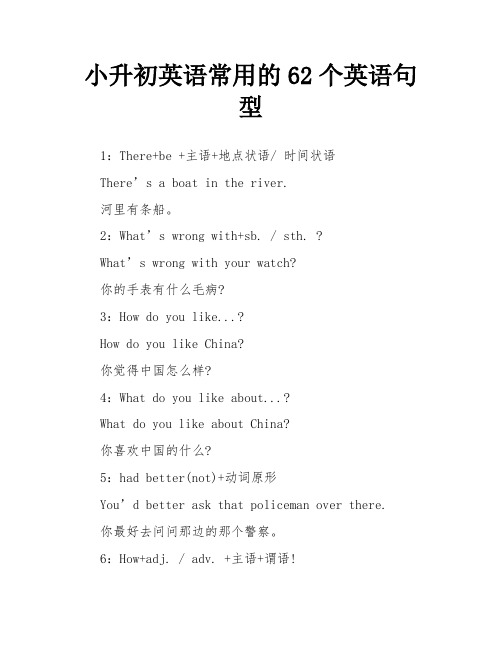
小升初英语常用的62个英语句型1:There+be +主语+地点状语/ 时间状语There’s a boat in the river.河里有条船。
2:What’s wrong with+sb. / sth. ?What’s wrong with your watch?你的手表有什么毛病?3:How do you like...?How do you like China?你觉得中国怎么样?4:What do you like about...?What do you like about China?你喜欢中国的什么?5:had better(not)+动词原形You’d better ask that policeman over there.你最好去问问那边的那个警察。
6:How+adj. / adv. +主语+谓语!What a/ an+adj. +n. +主语+谓语!How cold it is today !今天多冷啊!What a fine picture it is!多美的一幅图画呀!7:Thank+sb. +for(doing)sth.Thank you for ing to see me.感谢你来看我。
8:So+be/ 情态动词/ 助动词+主语He is a student. So am I.他是一个学生,我也是。
9:... not ... until ...He didn’t have supper until his parents came back.直到他的父母回来他才吃饭。
10:比较级+and+比较级The baby cried harder and harder.那孩子哭得越来越厉害。
11:the +比较级,the +比较级The more one has,the more one wants.越有越贪。
12:... as +adj./ adv.+as ...…not as(so) +adj. / adv. +as ...Do you think that art is as important as music?你认为艺术和音乐一样重要吗?Last Sunday the weather was not so wet as it is today.上个星期天的天气不如今天的天气潮湿。
小升初重要知识点归纳常见句型与句式转换技巧
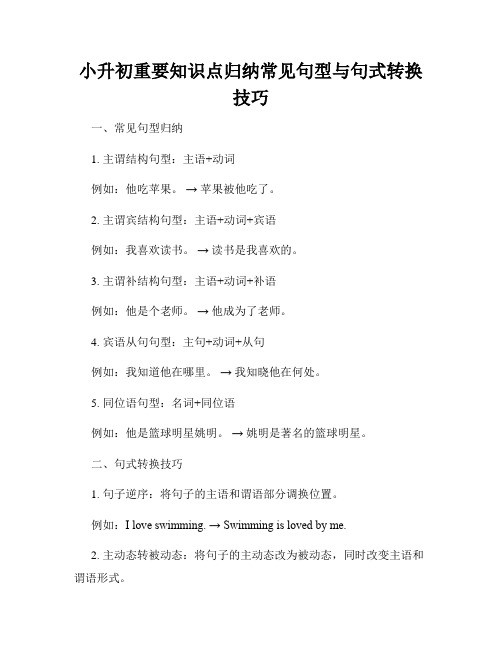
小升初重要知识点归纳常见句型与句式转换技巧一、常见句型归纳1. 主谓结构句型:主语+动词例如:他吃苹果。
→ 苹果被他吃了。
2. 主谓宾结构句型:主语+动词+宾语例如:我喜欢读书。
→ 读书是我喜欢的。
3. 主谓补结构句型:主语+动词+补语例如:他是个老师。
→ 他成为了老师。
4. 宾语从句句型:主句+动词+从句例如:我知道他在哪里。
→ 我知晓他在何处。
5. 同位语句型:名词+同位语例如:他是篮球明星姚明。
→ 姚明是著名的篮球明星。
二、句式转换技巧1. 句子逆序:将句子的主语和谓语部分调换位置。
例如:I love swimming. → Swimming is loved by me.2. 主动态转被动态:将句子的主动态改为被动态,同时改变主语和谓语形式。
例如:He plays football. → Football is played by him.3. 被动态转主动态:将句子的被动态改为主动态,同时改变主语和谓语形式。
例如:The book was written by her. → She wrote the book.4. 直接引语转间接引语:将直接引语改为间接引语,并相应修改动词和人称。
例如:"I am happy," he said. → He said that he was happy.5. 定语从句转定语从句:将定语从句转换为非限制性定语从句。
例如:The boy who is wearing a blue jacket is my brother. → The boy, wearing a blue jacket, is my brother.6. 条件句转换:将条件句从虚拟语气转换为陈述语气,或者反过来。
例如:I f it rains tomorrow, we won't go to the park. → We won't go to the park if it rains tomorrow.以上是小升初重要知识点中常见句型的归纳以及句式转换的技巧。
小升初英语常见的9大重点句型
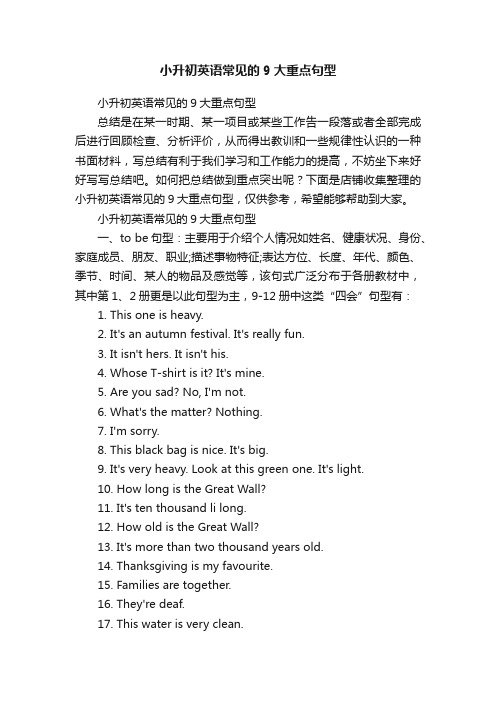
小升初英语常见的9大重点句型小升初英语常见的9大重点句型总结是在某一时期、某一项目或某些工作告一段落或者全部完成后进行回顾检查、分析评价,从而得出教训和一些规律性认识的一种书面材料,写总结有利于我们学习和工作能力的提高,不妨坐下来好好写写总结吧。
如何把总结做到重点突出呢?下面是店铺收集整理的小升初英语常见的9大重点句型,仅供参考,希望能够帮助到大家。
小升初英语常见的9大重点句型一、to be句型:主要用于介绍个人情况如姓名、健康状况、身份、家庭成员、朋友、职业;描述事物特征;表达方位、长度、年代、颜色、季节、时间、某人的物品及感觉等,该句式广泛分布于各册教材中,其中第1、2册更是以此句型为主,9-12册中这类“四会”句型有:1. This one is heavy.2. It's an autumn festival. It's really fun.3. It isn't hers. It isn't his.4. Whose T-shirt is it? It's mine.5. Are you sad? No, I'm not.6. What's the matter? Nothing.7. I'm sorry.8. This black bag is nice. It's big.9. It's very heavy. Look at this green one. It's light.10. How long is the Great Wall?11. It's ten thousand li long.12. How old is the Great Wall?13. It's more than two thousand years old.14. Thanksgiving is my favourite.15. Families are together.16. They're deaf.17. This water is very clean.18. It's fun to drink this way.19. How much is it? It's thirteen dollars and twenty-five cents.20. What's the matter?21. I'm really excited.二、there be句型:包括现在与过去两种,即:there is/are, there was/were。
小学英语小升初必备短语句型汇总(共22组)

小学英语必备短语句型一、+doing1. be busy doing sth.忙于做某事Mike is busy studying.麦克忙于学习。
2. be interested (in) doing sth. 对做某事感兴趣I'm interested (in) playing guitar.我对弹吉他感兴趣。
3. be worth doing sth. 值得做某事It's an idea that may be worth revisiting at a later date. 这个观点值得以后进一步探讨。
4. enjoy doing sth.喜欢做某事I enjoy working with you very much.我很喜欢和你一起工作5. succeed (in) doing sth.成功做某事He succeeded in finishing this task .他成功的完成了这项任务。
6. finish doing sth. 做完某事Could you help me after I finish reading?我读完书你能帮我吗?7. have fun doing sth. 做某事有趣I have fun working in my studio.我在工作室的工作很有意思。
8.have problem doing sth.做某事有困难They had problem making the new model.他们在做新模具的时候遇到了困难。
9. hear sb. doing sth. 听见某人正在做某事Listen! I hear someone crying.听!我听见有人在哭。
10. keep doing sth.坚持做某事I keep practicing spoken English every day.我坚持每天练习英语口语。
11. spend… (in) doing sth.花费……做某事We spent three years (in) following this herd.我们花了三年时间跟踪这个兽群。
小升初必考英语知识点总结
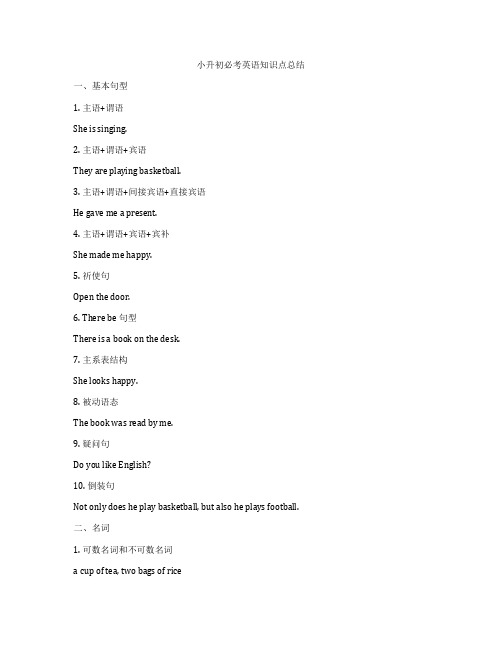
小升初必考英语知识点总结一、基本句型1. 主语+谓语She is singing.2. 主语+谓语+宾语They are playing basketball.3. 主语+谓语+间接宾语+直接宾语He gave me a present.4. 主语+谓语+宾语+宾补She made me happy.5. 祈使句Open the door.6. There be 句型There is a book on the desk.7. 主系表结构She looks happy.8. 被动语态The book was read by me.9. 疑问句Do you like English?10. 倒装句Not only does he play basketball, but also he plays football.二、名词1. 可数名词和不可数名词a cup of tea, two bags of rice2. 名词的所有格my father's car3. 名词的单复数a book, two books4. 特殊名词的复数形式child-children, woman-women5. 特殊名词的不可数名词形式news, information6. 特殊名词的复合名词形式forget-me-not, passer-by三、冠词1. 定冠词和不定冠词a book, the book2. 不加冠词的情况He is a student.3. 特殊用法once upon a time四、代词1. 人称代词I, you, he, she, it, we, they2. 物主代词my, your, his, her, its, our, their3. 反身代词myself, yourself, himself, herself, itself, ourselves, themselves 4. 特殊用法one another, each other五、动词1. 一般现在时He plays basketball every day.2. 一般过去时I played computer games yesterday.3. 一般将来时I will go to the park tomorrow.4. 现在进行时She is reading a book now.5. 过去进行时He was playing basketball at this time yesterday.6. 情态动词can, may, must, should, need7. 动词的不定式to do, to be8. 动词的-ing形式reading, playing9. 动词的完成时I have read that book.10. 动词的被动语态The book was read by me.11. 及物动词和不及物动词I like singing.六、形容词和副词1. 形容词的比较级和最高级big-bigger-biggest2. 副词的用法She sings well.3. 物主形容词my, your, his, her, its, our, their4. 特殊形容词和副词good-better-best, well-better-best七、介词1. in, on, at的用法in the classroom, on the desk, at home2. 特殊介词的用法under, over, between, among3. 介词短语in front of, next to, to the left of4. 介词词组on time, in time八、连词1. and, but, or的用法She likes playing basketball and football.2. because, so的用法He is tired because he works hard.3. 特殊连词的用法either...or, neither...nor, not only...but also...九、数词1. 基数词和序数词one, first2. 特殊数词的用法the first of October, one and a half 3. 特殊用法three times a week, two hours' time十、时间1. 日常时间的表达at seven o'clock, in the morning2. 一般现在时表示的未来情况I leave for Beijing tomorrow.3. 特殊时间状语的用法last Sunday, next Tuesday十一、情态动词1. can, may, must, shouldI can swim.2. 特殊情态动词的用法would like, need3. 特殊用法had better, have to十二、虚拟语气1. if引导的虚拟条件句If I were you, I would go now.2. wish引导的虚拟句I wish I were a bird.3. 特殊用法It's high time, If only十三、疑问句和感叹句1. 一般疑问句Do you like English?2. 特殊疑问句What's your name?3.感叹句What a nice day it is!四、定语和被定语1. 定语的位置和形式the red book, the book on the desk2. 被定语的位置和形式a city of the world, a boy with big eyes3. 特殊用法a cup of tea, the mother of all rivers 十五、主谓一致1. 就近原则Neither she nor I am good at singing.2. 特殊用法There be 句型十六、宾语从句1. 特殊宾语从句的引导词I know who the man is.2. 特殊宾语从句的时态I think he will come soon.十七、主语从句1. 特殊主语从句的引导词What you have said is true.2. 特殊主语从句的时态It's clear that they have won the game. 十八、定语从句1. 特殊定语从句的引导词The boy who is swimming is my friend.2. 特殊定语从句的时态I have lost the pen that you gave me.十九、状语从句1. 时间状语从句When the bell rang, we stopped working.2. 地点状语从句Where there is a will, there is a way.3. 原因状语从句Because he was ill, he didn't go to work.4. 条件状语从句If I were you, I would go now.5. 结果状语从句It's so late that we can't go out.六、语音1. 单词中元音的发音cake, team2. 单词中辅音的发音break, cream3. 单词重读音节的规律beautiful, comfortable4. 特殊音标的发音ai, ee, th七、词汇1. 同义词happy-glad, big-large2. 反义词happy-sad, big-small3. 同音词see-sea, for-four4. 词根act, behave5. 词缀happy-unhappy, Sunday-weekend 8、语法1. 句子成分的转换He doesn't like playing basketball. Playing basketball is not liked by him.2. 句子类型的转换She can swim. - Can she swim?十九、阅读1. 阅读理解阅读短文,回答问题。
小升初句型知识点归纳总结

小升初句型知识点归纳总结一、基本句型1. 主语+谓语例句: Mary sings.翻译: 玛丽唱歌。
2. 主语+谓语+宾语例句: They buy a book.翻译: 他们买了一本书。
3. 主语+谓语+宾语+宾补例句: My father made me happy.翻译: 我父亲使我快乐。
4. 主语+谓语+间宾+直宾例句: She sent me a letter.翻译: 她寄给我一封信。
5. 主语+系动词+表语例句: You are my good friend.翻译: 你是我的好朋友。
6. There be 句型例句: There is a cat on the desk.翻译: 桌子上有一只猫。
7. 含有助动词的句型例句: I can swim.翻译: 我会游泳。
二、疑问句1. 一般疑问句例句: Are you a student?翻译: 你是学生吗?2. 特殊疑问句例句: What’s your name?翻译: 你叫什么名字?三、否定句1. 否定句例句: I don’t like bananas.翻译: 我不喜欢香蕉。
2. 否定意义句例句: He can’t swim.翻译: 他不会游泳。
四、祈使句例句: Close your book.翻译: 关上你的书。
五、感叹句例句: How beautiful the flowers are! 翻译: 这些花多美啊!六、陈述句变疑问句例句: He is a teacher. → Is he a teacher?七、介词短语1. in the morning例句: I get up at 7:00 in the morning. 翻译: 我早上7点起床。
2. at school例句: We have English class at school.翻译: 我们在学校上英语课。
八、对等连接词1. and例句: I like basketball and football.翻译: 我喜欢篮球和足球。
小升初英语专项十:祈使句,感叹句,there be句型
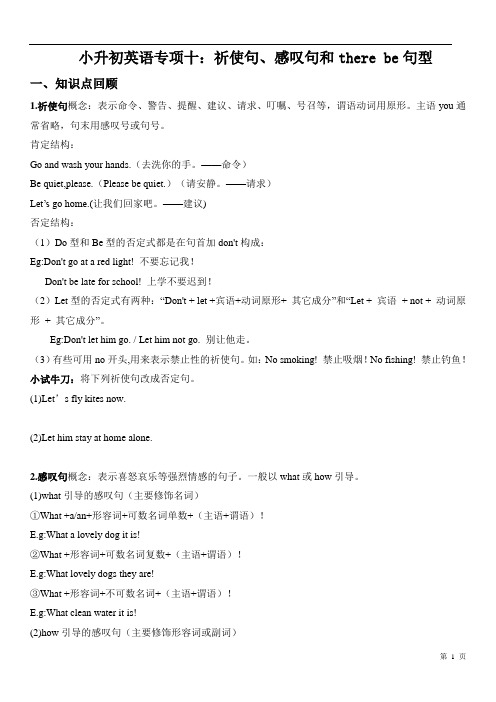
小升初英语专项十:祈使句、感叹句和there be句型一、知识点回顾1.祈使句概念:表示命令、警告、提醒、建议、请求、叮嘱、号召等,谓语动词用原形。
主语you通常省略,句末用感叹号或句号。
肯定结构:Go and wash your hands.(去洗你的手。
——命令)Be quiet,please.(Please be quiet.)(请安静。
——请求)Let’s go home.(让我们回家吧。
——建议)否定结构:(1)Do型和Be型的否定式都是在句首加don't构成:Eg:Don't go at a red light! 不要忘记我!Don't be late for school! 上学不要迟到!(2)Let型的否定式有两种:“Don't + let +宾语+动词原形+ 其它成分”和“Let + 宾语+ not + 动词原形+ 其它成分”。
Eg:Don't let him go. / Let him not go. 别让他走。
(3)有些可用no开头,用来表示禁止性的祈使句。
如:No smoking! 禁止吸烟!No fishing! 禁止钓鱼!小试牛刀:将下列祈使句改成否定句。
(1)Let’s fly kites now.____________________________________________________________________(2)Let him stay at home alone.____________________________________________________________________2.感叹句概念:表示喜怒哀乐等强烈情感的句子。
一般以what或how引导。
(1)what引导的感叹句(主要修饰名词)①What +a/an+形容词+可数名词单数+(主语+谓语)!E.g:What a lovely dog it is!②What +形容词+可数名词复数+(主语+谓语)!E.g:What lovely dogs they are!③What +形容词+不可数名词+(主语+谓语)!E.g:What clean water it is!(2)how引导的感叹句(主要修饰形容词或副词)How +形容词/副词+(主语+谓语)!E.g:How fast he runs!有关感叹句的选择题或填空题————做题方法(1)先找主语和谓语(一般先确定谓语动词)有名词①可数名词单数——what a/an(2)再看主语前有无名词②可数名词复数③不可数名词what无名词———how小试牛刀:用what或how填空。
北京小升初英语重点句型讲义练习一
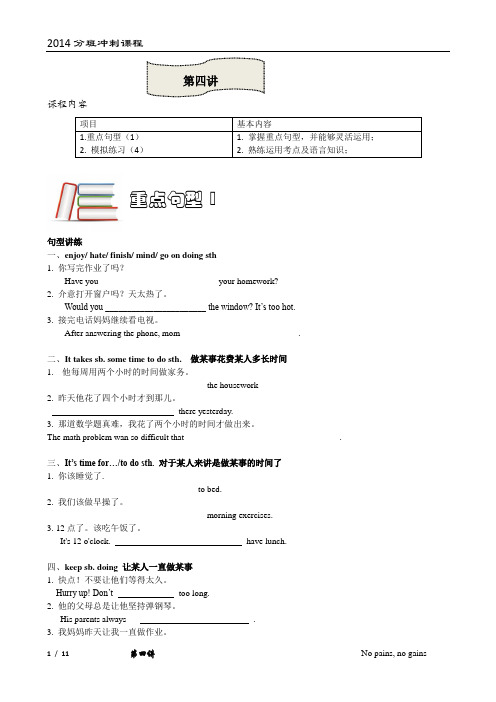
课程内容句型讲练一、enjoy/ hate/ finish/ mind/ go on doing sth 1. 你写完作业了吗?Have you _________________________ your homework? 2. 介意打开窗户吗?天太热了。
Would you _______________________ the window? It’s too hot. 3. 接完电话妈妈继续看电视。
After answering the phone, mom __________________________ .二、It takes sb. some time to do sth. 做某事花费某人多长时间 1. 他每周用两个小时的时间做家务。
____________________________________ the housework 2. 昨天他花了四个小时才到那儿。
___ there yesterday.3. 那道数学题真难,我花了两个小时的时间才做出来。
The math problem wan so difficult that ___________________________________.三、It’s time for…/to do sth. 对于某人来讲是做某事的时间了 1. 你该睡觉了.__________________________________ to bed. 2. 我们该做早操了。
____________________________________ morning exercises. 3. 12点了。
该吃午饭了。
It's 12 o'clock. _________ have lunch.四、keep sb. doing 让某人一直做某事 1. 快点!不要让他们等得太久。
Hurry up! Don’ttoo long.2. 他的父母总是让他坚持弹钢琴。
小升初英语语法知识点 12句式 全国通用
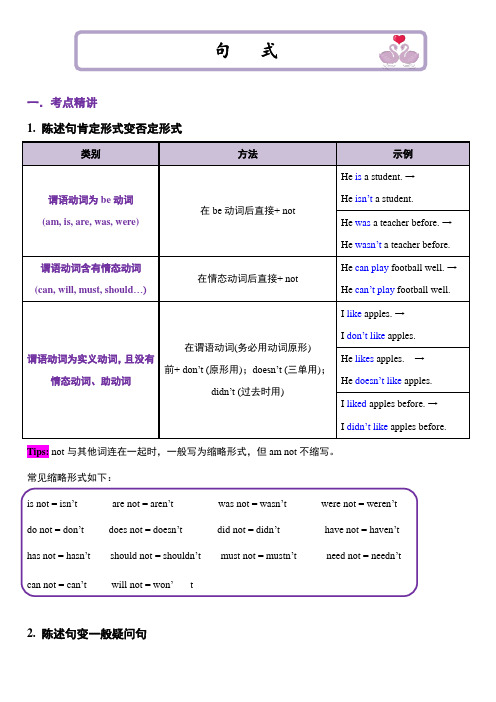
句式一.考点精讲1. 陈述句肯定形式变否定形式类别方法示例谓语动词为be动词(am, is, are, was, were) 在be动词后直接+ notHe is a student. →He isn’t a student.He was a teacher before. →He wasn’t a teacher before.谓语动词含有情态动词(can, will, must, should…)在情态动词后直接+ notHe can play football well. →He can’t play football well.谓语动词为实义动词,且没有情态动词、助动词在谓语动词(务必用动词原形)前+ don’t (原形用);doesn’t (三单用);didn’t (过去时用)I like apples. →I don’t like apples.He likes apples. →He doesn’t like apples.I liked apples before. →I didn’t like apples before.Tips: not与其他词连在一起时,一般写为缩略形式,但am not不缩写。
常见缩略形式如下:is not = isn’t are not = aren’t was not = wasn’t were not = weren’t do not = don’t does not = doesn’t did not = didn’t have not = haven’t has not = hasn’t should not = shouldn’t must not = mustn’t need not = needn’t can not = can’t will not = won’t2. 陈述句变一般疑问句Tips: 在一般疑问句时,注意人称的变换I,we改为you; my, our改为your 除了“Can I…?”“Would you like …?”这两种的some不用改为any之外,其余疑问句中的some要改为any。
小升初英语重点句型及用法

【导语】⼩升初中,英语是很多学⽣都觉得很难的科⽬,其实只要做好知识点总结也不难了。
为⼤家⼒荐了⼩升初英语重点句型及⽤法,给⼤家作为参考,欢迎阅读! ⼀、Can 引导的疑问句及陈述句的⽤法 1、询问他⼈是否会做某事:Can + 主语+ do sth? 如: Can you run fast? 肯:Yes, I can. 否:No, I can’t。
2、询问⾃⼰是否可以吃(喝)某东西: Can I have…? 肯 Yes, you can. 否:No, you can’t。
3、Can 引导的陈述句。
肯定句:主语+ Can+ do sth. 如:This bird can fly。
否定句:主语+ Can’t + do sth。
如:You can’t go out。
⼆、将来时态be + going to 的⽤法 1、陈述句。
主语+be + going to do… . 如:I’m going to run a race. 我将要参加赛跑。
主语+be + going to be …. 如:I’m going to be a doctor. 我要成为⼀名医⽣。
2、⼀般疑问句:be +主语+ going to do…? 如:Are you going to go to Hong Kong? 肯: Yes, I am. 否:No, I’m not。
3、特殊疑问句:特殊疑问词+ be+主语+going to…? 如:What are you going to do ? 答:I’m going to …。
三、 Do you …? 的⽤法 如:Do you use chopsticks in England? 肯定回答:Yes, we do。
否定回答:No, we don’t。
这个句型是在询问某⼈是否做某事的情况下⽤的,在回答这类疑问句时,注意⼈称和肯定、否定⽤法就可以了。
四、完成时态 have/ has got的⽤法 1、陈述句。
小升初重点复习句型及详细讲解
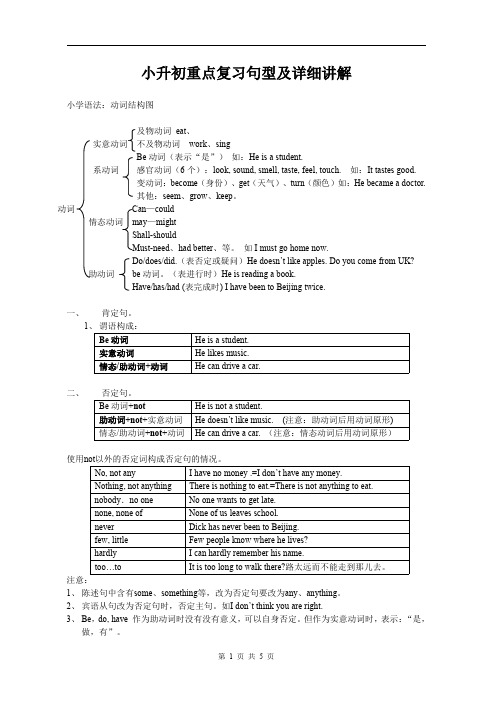
小升初重点复习句型及详细讲解小学语法:动词结构图及物动词eat、实意动词不及物动词work、singBe动词(表示“是”)如:He is a student.系动词感官动词(6个):look,sound,smell,taste,feel,touch.如:It tastes good.变动词:become(身份)、get(天气)、turn(颜色)如:He became a doctor.其他:seem、grow、keep。
动词Can—could情态动词may—mightShall-shouldMust-need、had better、等。
如I must go home now.Do/does/did.(表否定或疑问)He doesn’t like apples.Do you come from UK?助动词be动词。
(表进行时)He is reading a book.Have/has/had(表完成时)I have been to Beijing twice.一、肯定句。
1、谓语构成:Be动词He is a student.实意动词He likes music.情态/助动词+动词He can drive a car.二、否定句。
Be动词+not He is not a student.助动词+not+实意动词He doesn’t like music.(注意:助动词后用动词原形)情态/助动词+not+动词He can drive a car.(注意:情态动词后用动词原形)使用not以外的否定词构成否定句的情况。
No,not any I have no money.=I don’t have any money.Nothing,not anything There is nothing to eat.=There is not anything to eat.nobody.no one No one wants to get late.none,none of None of us leaves school.never Dick has never been to Beijing.few,little Few people know where he lives?hardly I can hardly remember his name.too…to It is too long to walk there?路太远而不能走到那儿去。
小升初英语重点句型及语法(必考)
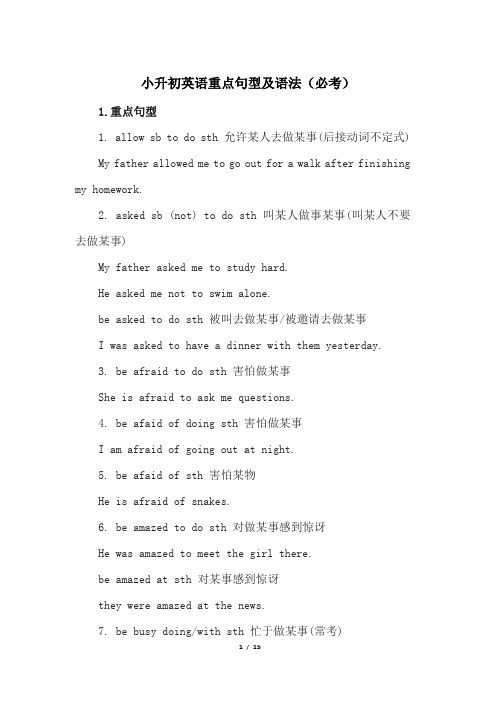
小升初英语重点句型及语法(必考)1.重点句型1. allow sb to do sth 允许某人去做某事(后接动词不定式)My father allowed me to go out for a walk after finishing my homework.2. asked sb (not) to do sth 叫某人做事某事(叫某人不要去做某事)My father asked me to study hard.He asked me not to swim alone.be asked to do sth 被叫去做某事/被邀请去做某事I was asked to have a dinner with them yesterday.3. be afraid to do sth 害怕做某事She is afraid to ask me questions.4. be afaid of doing sth 害怕做某事I am afraid of going out at night.5. be afaid of sth 害怕某物He is afraid of snakes.6. be amazed to do sth 对做某事感到惊讶He was amazed to meet the girl there.be amazed at sth 对某事感到惊讶they were amazed at the news.7. be busy doing/with sth 忙于做某事(常考)I was busy washing my car at that time. 那时候我正忙于清洗我的车子。
I am busy with my work.8. becoming/going/leaving/fiying/moving/dying(某些位移动词用进行时态时表将来)the bus is coming/the dog is dying.9. be excited to do sth 对做……感到兴奋Jacky was excited to travel there by plane.be excited at sthLily was excited at his words.be excited about doing sthhe was excited about passing the exam without going overing books.10. be frightened to do sth 害怕去做某事Sam is frightened to ride a horse.11. be glad/happy to do sth 高兴去做某事She is happy to clean theblackboard with me.be pleased to do sth高兴做某事She was pleased to helpthe old man yesterday.be pleased with sth 对某事感到高兴/满意The teacher was pleasedwith my answer.12.be interested in sth/doing sth 对某事感兴趣/对做某事感兴趣She is interested inswimming in the river.My btother is interestedin Chinese.13. be/get ready for/to do sthbe ready for 为某事做好了准备We are ready for the exam.Be ready to do sth 为做某事做好了准备We are ready to have a birthday party for her.get ready for sth为某事在做准备We are getting ready for the exam.14. be surprised to do sth 对做某事感到惊奇be surprised at sth 对某事感到惊奇This is nothing to be surprised at.I'd be surprised to see him on such an occasion.15. be worth doing sth 值得做某事(worth 后接动词-ing 形式,常考)It was too remote to be worth thinking about.16. 开始去做某事begin to do sth begin/start to do/doing sthWhen do children begin to go to school?17. can/be able to afford (to buy) sth 有能力负担(购买)……At this rate we won't be able to afford a holiday.18. can/may/must do sth could/would/should/might do sthWe may come at another time.19. can't wait todo sth 迫不急待地去做某事I can’t wait to hear the news.20. decide to do sth 决定去做某事make up one's mind to do sth 下决心去做某事(常考)make a decision to do sth 对做某事作出决定What do they decide to do?I have made up my mind to go with him21. deserve to do sth 值得/应该做……We must admit that she did deserve to win.22. encourage sb to do sth 鼓励某人去做某事Encourage them to do some other helpful recreations.23. enjoy doing sth 喜欢去做某事I enjoy reading the story book24. expect (sb) to do sth 期望去做某事Don't expect him to help you.25. fail to do sth 做某事失败succeed doing sth 成功做了某事If you don' t work, you willfail to pass the exam.26. finish doing sth 做完某事(后接动词-ing形式)(常考)After finish doing your homework, you can have a rest.27. follow sb to do sth 跟随某人去做某事Follow me to read the new words.28. get sb to do sth / make sb do sth/ let sb do st 让某人做某事(后接动词原形)Her jokes made us laugh.29. get/have a chance to do sth 得到一个做某事的机会I'm very happy to have a chance to visit your school.30. give/pass/show/lend/sell sb sth/sth to sbbuy/get/bring sb sth/sth for sbPlease give me a piece of paper.I bought him a drink in return for his help.31. go on to do sth /go on doing sth 继续做事(常考)Go on doing the exercise after a short rest.32. hate to do/doing sth 讨厌/不喜欢做某事Ihate to tell the news to you.33. have fun doing sth 做某事很有趣Have fun getting to know each other.34. have problems doing sth 做某事遇到困难Many people have problems getting to sleep at night.35. have sb do sth/have sth done 让某人做某事This is the best work you have ever done.36. hear sb do sth 听到某人做某事(后接动词原形,常考) hear sb doing sth 听到某人正在做某事(常见)I heard someone laughing.37. help to do sth 帮忙做某事help sb (to) do sth 帮助某人做某事I'll help you clean the room.38. hope/wish to do sth 希望做某事wish sb to do sth 希望某人做某事I wish to take this opportunity to thank you all.39. It seems that 这像是……(后接从句)seem to do sthseem +adjIt'seems that you are lying.Does that seem to make sense?40. It's + adj+(for sb) to do sth .It's+adj +(of sb) to do sthIt's glad for him to hear the news.2.10大语法知识点一、小学英语形容词性物主代词1、形容词性物主代词8个:My your his her its our your their我的你的他的她的它的我们的你们的他(她、它)们的2、形容词性物主代词的特点:1)译成汉语都有"的" eg:my 我的 their 他们的2)后面加名词: eg:my backpack his name3)前后不用冠词 a an theThis is a my eraser(错误) That is your a pen(错误) It's his the pen(错误)3、I(物主代词)my you(物主代词)your he (物主代词)her we (物主代词) our注:在变物主代词时,把原题所给的词加上的,再译成单词就可以了。
最新人教版小升初英语必考知识点总结
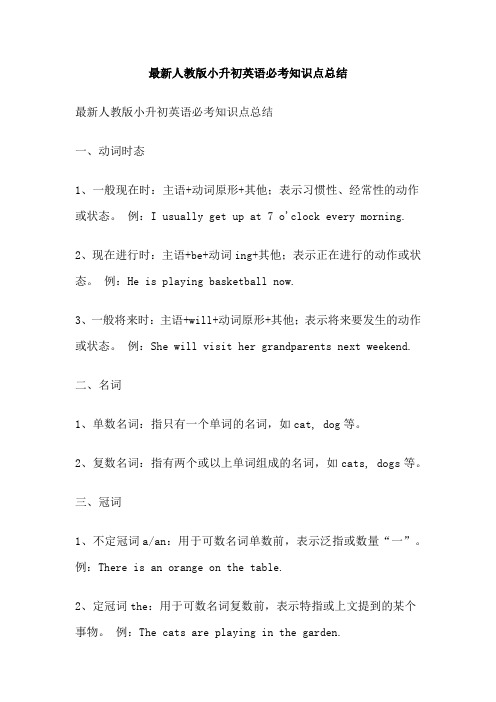
最新人教版小升初英语必考知识点总结最新人教版小升初英语必考知识点总结一、动词时态1、一般现在时:主语+动词原形+其他;表示习惯性、经常性的动作或状态。
例:I usually get up at 7 o'clock every morning.2、现在进行时:主语+be+动词ing+其他;表示正在进行的动作或状态。
例:He is playing basketball now.3、一般将来时:主语+will+动词原形+其他;表示将来要发生的动作或状态。
例:She will visit her grandparents next weekend.二、名词1、单数名词:指只有一个单词的名词,如cat, dog等。
2、复数名词:指有两个或以上单词组成的名词,如cats, dogs等。
三、冠词1、不定冠词a/an:用于可数名词单数前,表示泛指或数量“一”。
例:There is an orange on the table.2、定冠词the:用于可数名词复数前,表示特指或上文提到的某个事物。
例:The cats are playing in the garden.四、代词1、人称代词:指用来代替人的代词,如I, you, he等。
2、物主代词:指用来表示物品所属关系的代词,如my, your, his 等。
五、形容词和副词1、形容词:用来修饰名词,表示名词的性质或状态,如beautiful, happy等。
2、副词:用来修饰动词、形容词或其他副词,表示动作的方式或程度,如quickly, carefully等。
六、介词1、表示时间的介词:in表示在某个时间范围之内,on表示在某一天或具体某一天的上午或下午,at表示在某一具体时间点。
例:I will arrive at the airport at 10 o'clock.2、表示地点的介词:in表示在某个地方范围之内,on表示在某物表面上,at表示在某个具体地点。
专题12 四大句型(陈述句、疑问句、祈使句和感叹句)_备战2021年小升初英语必考语法和题型(解析版
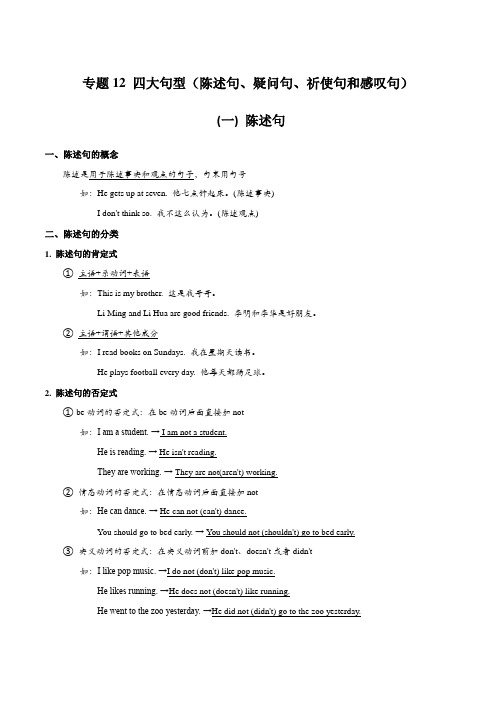
专题12 四大句型(陈述句、疑问句、祈使句和感叹句)(一) 陈述句一、陈述句的概念陈述是用于陈述事实和观点的句子,句末用句号如:He gets up at seven. 他七点钟起床。
(陈述事实)I don't think so. 我不这么认为。
(陈述观点)二、陈述句的分类1. 陈述句的肯定式①主语+系动词+表语如:This is my brother. 这是我哥哥。
Li Ming and Li Hua are good friends. 李明和李华是好朋友。
②主语+谓语+其他成分如:I read books on Sundays. 我在星期天读书。
He plays football every day. 他每天都踢足球。
2. 陈述句的否定式① be动词的否定式:在be动词后面直接加not如:I am a student. → I am not a student.He is reading. → He isn't reading.They are working. → They are not(aren't) working.②情态动词的否定式:在情态动词后面直接加not如:He can dance. → He can not (can't) dance.You should go to bed early. → You should not (shouldn't) go to bed early.③实义动词的否定式:在实义动词前加don't、doesn't或者didn't如:I like pop music. →I do not (don't) like pop music.He likes running. →He does not (doesn't) like running.He went to the zoo yesterday. →He did not (didn't) go to the zoo yesterday.基础闯关(限时10分钟满分10分)一、按要求写句子。
小升初重要知识归纳基础句型与常用表达总结
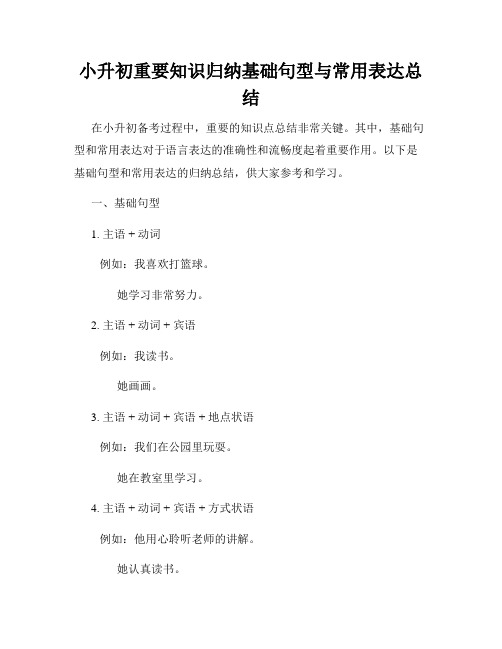
小升初重要知识归纳基础句型与常用表达总结在小升初备考过程中,重要的知识点总结非常关键。
其中,基础句型和常用表达对于语言表达的准确性和流畅度起着重要作用。
以下是基础句型和常用表达的归纳总结,供大家参考和学习。
一、基础句型1. 主语 + 动词例如:我喜欢打篮球。
她学习非常努力。
2. 主语 + 动词 + 宾语例如:我读书。
她画画。
3. 主语 + 动词 + 宾语 + 地点状语例如:我们在公园里玩耍。
她在教室里学习。
4. 主语 + 动词 + 宾语 + 方式状语例如:他用心聆听老师的讲解。
她认真读书。
5. 主语 + 动词 + 宾语 + 时间状语例如:我们在周末去游泳。
她每天晚上写作业。
二、常用表达1. 问候与回应- 问候:你好!/ 早上好!/ 下午好!/ 晚上好!- 回应:你好!/ 早上好!/ 下午好!/ 晚上好!2. 自我介绍与对话- 自我介绍:我叫…/我今年…岁/我喜欢…- 对话:你喜欢什么颜色?/我喜欢红色。
/你最喜欢做什么?/我最喜欢画画。
3. 请求与应答- 请求:请你帮我一个忙好吗?- 应答:当然可以。
4. 道歉与原谅- 道歉:对不起,我不小心碰倒了你的书。
- 原谅:没关系,我没受伤就好。
5. 表达喜欢与不喜欢- 喜欢:我喜欢吃冰淇淋。
- 不喜欢:我不喜欢下雨天。
6. 数字与数量- 数字:一、二、三、四、五、六、七、八、九、十- 数量:很多、一些、几个、几天等。
7. 表达兴趣与爱好- 兴趣:我对音乐感兴趣。
- 爱好:我喜欢跳舞。
8. 询问与回答问题- 询问:你的学校是哪个?/你喜欢什么科目?- 回答:我是XX学校的。
/我喜欢数学。
9. 表示感谢与回应- 感谢:谢谢你帮助我。
- 回应:不用谢,我很愿意帮助你。
三、总结以上是小升初备考过程中的重要知识点——基础句型和常用表达的归纳总结。
通过掌握这些基础句型和常用表达,可以提高语言表达的准确性和流畅度,为小升初考试打下坚实的基础。
在学习过程中,要多加练习、多实践,以提高自己的语言表达能力。
小升初英语考试十个常考句型知识点

小升初英语考试十个常考句型知识点2014-10-06呼市小升初那点事儿小升初,英语有哪些常考的知识点“以下整理的十个常考的知识点,希望对同学们有帮助。
1.动词be(is,am,are)的用法 我(I)用am, 你(you)用are,is跟着他(he),她(she),它(it)。
单数名词用is,复数名词全用are。
变否认,更容易,be后not加上去。
变疑问,往前提,句末问号莫丢弃。
还有一条须注意,句首大写莫忘记。
2.this,that和it用法(1)this和that是指示代词,it是人称代词。
(2)距离说话人近的人或物用this, 距离说话人远的人或物用that。
如: This is a flower. 这是一朵花。
(近处)That is a tree. 那是一棵树。
(远处)(3)放在一起的两样东西,先说this, 后说that。
如:This is a pen. That is a pencil. 这是一支钢笔。
那是一支铅笔。
(4)向别人介绍*人时说This is…, 不说That is…。
如:This is Helen. Helen, this is Tom. 这是海伦,海伦,这是汤姆。
(5)This is 不能缩写, 而That is可以缩写。
如:This is a bike. That’s a car. 这是一辆自行车。
那是一辆轿车。
(6)打时,介绍自己用this, 询问对方用that。
如:-Hello! Is that Miss Green“喂,是格林小姐吗“-Yes, this is. Who’s that“是的,我是,你是谁“ 注意:虽然汉语中使用“我〞和“你〞,但英语中打时绝不可以说:I am…, Are you…“/Who are you“(7)在答复this或that作主语的疑问句时, 要用it代替this或that。
如:①-Is this a notebook“这是笔记本吗“-Yes, it is. 是的,它是。
- 1、下载文档前请自行甄别文档内容的完整性,平台不提供额外的编辑、内容补充、找答案等附加服务。
- 2、"仅部分预览"的文档,不可在线预览部分如存在完整性等问题,可反馈申请退款(可完整预览的文档不适用该条件!)。
- 3、如文档侵犯您的权益,请联系客服反馈,我们会尽快为您处理(人工客服工作时间:9:00-18:30)。
70个重点句型。
熟知了这些句型,不仅可以增加学习知识积累,更可以提高英语写作能力。
重点句型如下:
1、allow sb to do sth 允许某人去做某事(后接动词不定式)
My father allowed me to go out for a walk after finishing my homework.
2、asked sb (not) to do sth 叫某人做事某事(叫某人不要去做某事)
My father asked me to study hard.
He asked me not to swim alone.
be asked to do sth 被叫去做某事/被邀请去做某事
I was asked to have a dinner with them yesterday.
3、be afraid to do sth 害怕做某事
She is afraid to ask me questions.
4、be afaid of doing sth 害怕做某事
I am afraid of going out at night.
5、be afaid of sth 害怕某物
He is afraid of snakes.
6、be amazed to do sth 对做某事感到惊讶
He was amazed to meet the girl there.
be amazed at sth 对某事感到惊讶
they were amazed at the news.
7、be busy doing/with sth 忙于做某事(常考)
I was busy washing my car at that time. 那时候我正忙于清洗我的车子。
I am busy with my work.
8、be coming/going/leaving/fiying/moving/dying(某些位移动词用进行时态时表将来)the bus is coming/the dog is dying.
9、be excited to do sth 对做……感到兴奋
Jacky was excited to travel there by plane.
be excited at sth
Lily was excited at his words.
be excited about doing sth
he was excited about passing the exam without going overing books.
10、be frightened to do sth 害怕去做某事
Sam is frightened to ride a horse.
11、be glad/happy to do sth 高兴去做某事
she is happy to clean the blackboard with me.
be pleased to do sth高兴做某事
she was pleased to help the old man yesterday.
be pleased with sth 对某事感到高兴/满意
the teacher was pleased with my answer.
12.be interested in sth/doing sth 对某事感兴趣/对做某事感兴趣
she is interested in swimming in the river.
My btother is interested in Chinese.
13. be/get ready for/to do sth
Be ready for sth 为某事做好了准备
We are ready for the exam.
Be ready to do sth 为做某事做好了准备
We are ready to have a birthday party for her.
get ready for sth为某事在做准备
We are getting ready for the exam.
get ready for sth 为做某事而做准备
13、be sorry to do sth 对做某事感到抱歉
14、be surprised to do sth 对做某事感到惊奇
be surprised at sth 对某事感到惊奇
15、be worth doing sth 值得做某事(worth 后接动词-ing形式,常考)
16、开始去做某事
begin to do sth
begin/start to do/doing sth
17、can/be able to afford (to buy) sth 有能力购买(供)……
18、can/may/must do sth could/would/should/might do sth
19、can't wait to do sth 迫不急待地去做某事
20、decide to do sth 决定去做某事
make up one's mind to do sth 下决心去做某事(常考)
make a decision to do sth 对做某事作出决定
21、deserve to do sth 值得/应该做……
22、encourage sb to do sth 鼓励某人去做某事
23、enjoy doing sth 乐意去做某事
24、expect (sb) to do sth 期望去做某事
25、fail to do sth 做某事失败
succeed doing sth 成功做了某事
26、finish doing sth 做完某事(后接动词-ing形式)(常考)
27、follow sb to do sth 跟随某人去做某事
28. 让某人做某事(后接动词原形)
get sb to do sth
make sb do sth
let sb do sth
29、get/have a chance to do sth 得到一个做某事的机会
30、give/pass/show/lend/sell sb sth/sth to sb
buy/get/bring sb sth/sth for sb
31、go on to do sth 继续做事(常考)
go on doing sth 继续做事(常考)
32、hate to do/doing sth 讨厌/不喜欢做某事
33、have fun doing sth
34、have problems doing sth 做某事遇到困难
35、让某人做某事(后接动词原形)
have sb do sth
have sth done
have sth to do 工有事要做。
